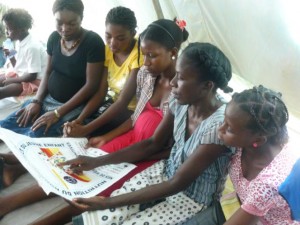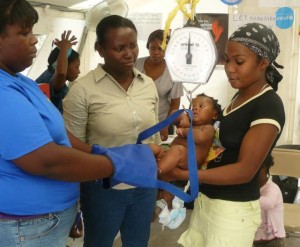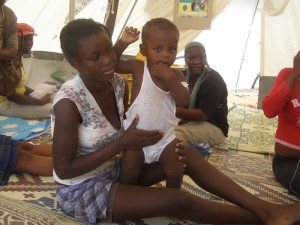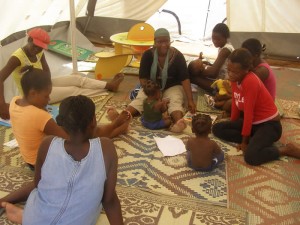
Mothers review a poster on food groups, provided by the IYCN Project, during a nutrition discussion at a baby tent in the Place Boyer Refugee Camp in Pétion-Ville, Haiti.
At the Place Boyer Refugee Camp in Pétion-Ville, a suburb of Port au Prince, Solange Pierre, 35, welcomes four mothers-to-be into the baby tent. Inside, the safe, calm atmosphere is a welcome relief for Ketly, 21; Cherline, 24; Spina, 16; and Immacula, 18, who live among the 3,000 temporary residents at the camp, where life can be stressful and uncertain. On this hot, March day, Solange leads a discussion about good nutrition during pregnancy. She asks the expecting mothers to share their experiences feeding their babies and shows them a poster of food groups as they sit on the floor.
“The baby tent is a place for mothers to come when life is simply too much to handle. They meet other mothers who have lost important parts of their lives with the earthquake. They sit and talk, they share, and they encourage each other,” said Solange.

At a baby tent in the Place St. Pierre Refugee Camp in Pétion-Ville, Haiti, counselors regularly assist mother Mona to weigh her baby Jonalson, 3 months, to check his growth.
Shortly after the January 12 earthquake, Solange started working as a counselor and baby tent coordinator for Project Concern International. With more than ten years of experience as a nurse, she wanted to make a difference by supporting mothers and children in the camps. In a typical day, she leads discussion groups on different nutrition topics, weighs children to monitor their growth, offers counseling on infant feeding, and walks around the camp encouraging mothers to visit the baby tent.
In late January, she participated in an IYCN training workshop for emergency workers from Project Concern International to improve nutrition knowledge and counseling skills in light of the emergency. The training has helped her offer accurate nutrition information and effective counseling for mothers.
After the IYCN training, encouraging mothers to relactate (the practice of starting to breastfeed again after stopping) is a priority for her and other counselors. She has seen many mothers who have stopped breastfeeding after the earthquake in response to a widespread cultural belief that breastmilk goes bad after a mother suffers an emotional shock. She now spreads the word about relactation: it is beneficial for babies and it is possible to begin breastfeeding again even after stopping for a few months.
“There are several things I had not understood well that I now understand [after the IYCN training], she said. “Relactation is one of them. I did not know it could be done, and since the baby tent has started we have had four mothers who are now breastfeeding again.”
Solange says that overcoming the misconceptions and barriers to good nutrition in the camps can be challenging, but her goal is to prevent malnutrition for all children.
“It can be done,” she asserts.
Learn more about IYCN activities in Haiti.
Date: Apr 6, 2010 | Category: Success stories


